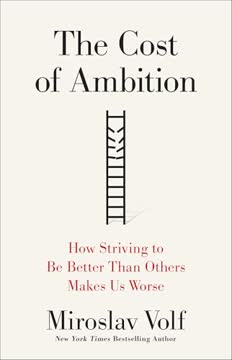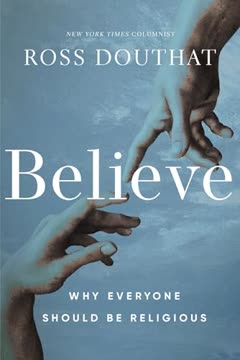Key Takeaways
1. Striving for Superiority: A Pervasive and Destructive Force
A sense of inferiority fuels striving for superiority, and striving for superiority is shadowed by feelings of both pride and inferiority.
Ubiquitous drive. Striving to be better than others is a deeply ingrained human tendency, evident from ancient emperors like Justinian, who boasted of outdoing Solomon in building Hagia Sophia, to everyday comparisons over cars or social media likes. This drive is distinct from striving for excellence, which focuses on self-improvement, as superiority often involves diminishing others or obstructing their success. The book argues that while striving for superiority can yield instrumental benefits (like Lionel Messi's fame), its moral value is highly questionable.
Societal damage. This pervasive quest for superiority infiltrates nearly every domain of modern life, from sports and education to politics and social media. It creates a relentless pressure to measure up, leading to widespread mental health issues like depression, which the author identifies as a "malady of inadequacy." The constant comparison, especially on curated social media platforms, fosters body dissatisfaction, disordered eating, and a plummeting sense of self-worth among individuals, particularly adolescents.
Erosion of values. When superiority becomes the dominant value, it can degrade the very goods it purports to achieve. For instance, the intense competition for elite education shifts the focus from learning for its own sake to mere status attainment, as seen in admissions scandals and the correlation between wealth and selective school enrollment. Similarly, in politics, the pursuit of dominance can eclipse the common good, leading to "truth decay" where leaders prioritize electoral victory over factual discourse, incentivizing dishonesty.
2. The "Worry of Comparison" Poisons Self-Worth
Fleeing from inferiority by striving for superiority kills her.
The lily's lament. Søren Kierkegaard illustrates the peril of comparison with the parable of a contented field lily. Upon learning from a "naughty bird" about more "gorgeous" lilies elsewhere, the little lily becomes consumed by "the worry of comparison," craving to become a "Crown Imperial" envied by all. This restless striving, born from a perceived inferiority, ultimately leads to its demise as it withers and dies in its futile pursuit of external validation.
Undermining humanity. Kierkegaard argues that this "restless mentality of comparison" is a "corrupting kind of defilement" that damages the soul. It leads to:
- Constant worry: Whether high or low on the comparative scale, individuals are plagued by anxiety—either how to rise or how to avoid being overtaken.
- Erosion of uniqueness: Competitive comparisons flatten individual particularities, reducing people to their success or failure on a single, often arbitrary, scale.
- Loss of self: Individuals become dispersed, constantly waiting for external validation to define "what he is now at this moment," leading to a fragile and unstable sense of identity.
Fictitious loftiness. For Kierkegaard, the "loftiness" or superiority that humans strive for is a fiction. While the qualities pursued (e.g., beauty, intelligence) may be real, the sense of superiority derived from them is illusory and dehumanizing. He contends that our "mere humanity" is an incomparably greater glory than any worldly distinction, and to pursue external loftiness at its expense is a form of spiritual "despair," a self-betrayal that leads to a ghostlike existence.
3. Satan's Ambition: The Futility of Ultimate Superiority
Till pride and worse ambition threw me down Warring in Heav’n against Heav’n’s matchless King.
Rebellion against creaturehood. In John Milton's Paradise Lost, Satan's striving for superiority is the cosmic engine of evil. As the "first Archangel, great in power," Satan cannot abide having a superior, viewing God's elevation of the Son as an "injured merit." His rebellion is not against injustice, but against his own ontological inferiority as a creature. To justify his grand insurrection, Satan fabricates a false ideology of angelic self-creation, demonstrating how the pursuit of superiority often necessitates distorting reality.
The torment of self-loathing. Satan's soliloquy reveals the agonizing truth: his war against God was an "evil return for good received," fueled by an "unbounded hope" to be "highest." His inability to repent stems from the unbearable shame of acknowledging inferiority, leading to a cycle of self-loathing even as he is "adored" on the throne of Hell. This "misery" is the "joy ambition finds," illustrating how frustrated striving for superiority can turn to diminishing competitors by destroying what they delight in, even if it means self-destruction.
Eve's compromised ambition. Eve's fall, too, is rooted in a desire for superiority, albeit more circumscribed. Satan exploits her discomfort with Adam's intellectual superiority, flattering her as "sov'reign mistress" and "universal dame." After eating the forbidden fruit, Eve hopes to "keep the odds of knowledge in my power" and become "sometime superior" to Adam, believing that "inferior who is free?" Her decision to share the fruit with Adam is driven not by love, but by the fear of ultimate inferiority if she were to die and he live on with another Eve.
4. True Glory Lies in Humble Service, Not Grasping for Status
Therefore God also highly exalted him and gave him the name that is above every name, so that at the name of Jesus every knee should bend, in heaven and on earth and under the earth, and every tongue should confess that Jesus Christ is Lord, to the glory of God the Father.
Christ's downward journey. The apostle Paul presents Jesus Christ as the ultimate counter-example to striving for superiority. In the Carmen Christi (Philippians 2:6-11), Christ, though existing in the "form of God" and equal with God, "did not regard equality with God as something to be grasped." Instead, he "emptied himself," taking the "form of a slave" and humbling himself to death on a cross—the ultimate "cursus pudorum" or "race of shames." This radical self-abasement was not a means to gain status, but the very essence of his divine glory.
Glory in self-giving. God's subsequent exaltation of Christ is not a reward for his suffering, but a public vindication that this self-giving love is glory. Christ's glory consists not in maintaining divine eminence or controlling others, but in serving others, even the most despised, to the point of shameful death. This demonstrates what it means to be the "Most High" when faced with the fragility and need of creatures.
A new standard of value. Paul urges Christians to adopt this "mind of Christ," to "do nothing from selfish ambition or empty conceit, but in humility regard others as better than yourselves" (Philippians 2:3). This means actively looking out for the interests of others, treating them as if they have higher standing and importance, irrespective of their merit. This mutual honoring, rooted in Christ's example, destabilizes worldly hierarchies and fosters a community of unconditional care and shared honor.
5. All Human Worth is a Gift, Negating Any Basis for Boasting
What do you have that you did not receive? And if you received it, why do you boast as if you did not receive?
The illusion of self-made. Paul directly challenges the very foundation of boasting and striving for superiority by asking, "Who makes you different from another? What do you have that you did not receive?" (1 Corinthians 4:7). His answer is implicit: nothing. Every aspect of a person's being—their existence, capacities, achievements, and even their righteousness before God—is a gift. Therefore, any claim to have worked oneself into a superior status is an "existential falsity," a lie that underpins the "wisdom" of a perishing world.
Boasting only in the Lord. Paul, once a zealous striver for religious superiority, came to regard his former "gains" (pedigree, blamelessness under the law) as "loss" or "rubbish" after encountering Christ. His new identity is "not having a righteousness of my own... but one that comes through faith in Christ" (Philippians 3:9). This "alien righteousness" is God's gift, precluding self-boasting. The only legitimate boasting is "in the Lord" (1 Corinthians 1:31), acknowledging Christ as the sole source of true wisdom, power, and standing, thus ending all claims of personal superiority.
Mutual reward. Paul redefines the concept of "reward" in a way that eliminates competition. When he speaks of his "crown of boasting," it is not an individual prize for his efforts, but the very people he has served: "Is it not you? Yes, you are our glory and joy!" (1 Thessalonians 2:19-20). This mutual joy means that all who embrace Christ's way are each other's reward, and together, they are Christ's crown. This shared, non-exclusive reward system renders striving for individual superiority oxymoronic.
6. God's "Foolishness" Redefines Power and Wisdom
God’s foolishness is wiser than human wisdom, and God’s weakness is stronger than human strength.
Challenging worldly standards. Paul confronts the Corinthian church, which, influenced by "super-apostles," preferred eloquent, powerful leaders and a "theology of glory" over Paul's "word of the cross." To them, Paul's message of a crucified Christ seemed foolish and weak. Paul asserts that this apparent "foolishness" and "weakness" of God is, in fact, "wiser than human wisdom" and "stronger than human strength" (1 Corinthians 1:25). This is not a competitive claim, but a declaration of an unalterable reality: the ephemeral nature of human power versus the enduring truth of God's self-giving love.
God's upside-down logic. God's method of redemption is to "choose what is foolish in the world to shame the wise; God chose what is weak in the world to shame the strong; God chose what is low and despised in the world, things that are not, to abolish things that are" (1 Corinthians 1:27-28). This divine strategy aims to dismantle the "structure of bragging" by ensuring "that no one might boast in the presence of God." It's not merely about turning the tables (making the weak strong), but about abolishing the very standards by which superiority is measured, creating a community where all have equal honor.
The paradox of boasting. In his second letter to the Corinthians, Paul, facing intense opposition, ironically engages in "boasting" to expose the folly of his opponents' values. He boasts not in his strengths, but in his weaknesses—his sufferings, persecutions, and perils—which, from a worldly perspective, make him an "inferior apostle." This "fool's speech" (2 Corinthians 11:16-12:10) demonstrates that even an "upside-down boast" is still a "fleshly boast," as any boasting relies on self-achievement to assert superiority. Paul's ultimate point is that all boasting, even in admirable service, is problematic because true agency belongs to Christ living within him.
7. Biblical Narratives Consistently Critique Striving for Preeminence
Whoever wants to be first must be last of all and servant of all.
Jesus's radical inversion. Jesus consistently challenges the pursuit of status. When James and John brazenly request the highest positions in his coming kingdom, Jesus rebukes their "jockeying for status." He declares that "whoever wishes to become great among you must be your servant, and whoever wishes to be first among you must be slave of all" (Mark 10:43-44). This is not a call to turn the hierarchy on its head (making inferiority the new superiority), but to render superiority itself a "nonvalue." Service is the goal, not a means to elevate oneself above others.
Old Testament precedents. The critique of striving for superiority is deeply embedded in the Hebrew Bible:
- Cain and Abel: Cain's murder of Abel is driven by a desire to reestablish his perceived superiority after God favors Abel's offering.
- Abraham's Call: God's choice of Abram (Genesis 12:1-3) is presented as unmerited grace, not based on any inherent quality or achievement, thus precluding any claim to superiority.
- Israel's Election: Deuteronomy 7:6-8 explicitly states that Israel was chosen not because of its size or any other attribute, but "because the Lord loved you." This unmerited election makes it "impossible for the attentive hearer of the text to identify chosenness with superiority."
- Creation of Adam: Rabbinic sages interpret Adam's solitary creation (Genesis 1) as a means to prevent future generations from boasting, "My father... is greater than your father," emphasizing the common origin and equal dignity of all humanity.
The flawed strivers. Even foundational figures like Jacob and Joseph are portrayed as intense strivers for superiority. Jacob ruthlessly bargains for Esau's birthright and deceives his father for the blessing. Joseph, a narcissistic youth, flaunts his favored status, leading to his enslavement. While both eventually undergo transformations, recognizing God's hand in their lives, their initial actions highlight the destructive nature of their ambition.
8. Divine Providence Works Through Flaws, But Doesn't Justify Them
Even though you intended to do harm to me, God intended it for good, in order to preserve a numerous people, as he is doing today.
God's crooked lines. The biblical narrative, particularly in Genesis, portrays God's providence at work even through human moral failures. Joseph's words to his brothers, "Even though you intended to do harm to me, God intended it for good" (Genesis 50:20), encapsulate this theme. God uses the brothers' cruel act of selling Joseph into slavery as a means to preserve Jacob's descendants during a famine. Similarly, God works through Jacob's trickery to make him the progenitor of Israel.
Not an "invisible hand." This divine providence is not akin to Adam Smith's "invisible hand," which transmutes private vices into public goods, thereby justifying or even valorizing self-interest and striving for superiority. The Bible does not sugarcoat or excuse the moral failings of its characters. It condemns Jacob's unscrupulousness and Joseph's narcissism, even while acknowledging that God's overarching purposes were achieved through these flawed actions.
Condemnation without justification. The text insists that God "knows how to write straight with crooked lines," meaning that God can achieve good outcomes despite human sin, but this does not "straighten" or justify the crookedness of the sin itself. The book argues that we must recognize both that striving for superiority can inadvertently lead to positive outcomes (e.g., innovation) and that it remains morally wrong and harmful. This dual perspective is crucial for abandoning the vice in favor of a different, more virtuous striving.
9. The Alternative: Mutual Honoring and Striving for Excellence in Love
Instead, whoever wishes to become great among you must be your servant, and whoever wishes to be first among you must be slave of all.
A new social order. The alternative to striving for superiority is a radical reorientation towards mutual honoring and service, exemplified by Christ. Paul urges Christians to "outdo one another in showing honor" (Romans 12:10), not in a competitive sense of gaining more honor, but in "leading the way" in unconditionally honoring others. This means treating every person as if they are "better than yourselves" (Philippians 2:3), focusing on their interests rather than one's own.
Service as glory. Jesus's life demonstrates that true greatness is found not in lording over others, but in serving them, even to the point of self-sacrifice. This service is not a means to achieve status, but the very content of glory itself. The goal is to alleviate suffering and increase the joy of those served, reflecting God's own character of generous, self-giving love.
Excellence, not superiority. The book advocates for a shift from striving for superiority to striving for excellence. This excellence is defined by purposes worthy of our God-given humanity, where the measure is not how we compare to others, but how we align with the example of Christ. This striving is not about winning a competition against others, but about living into our unique, God-given glory, where the success of one does not require the failure of another, and all can "win" in a shared pursuit of goodness.
10. Embracing Our God-Given Glory Beyond Comparison
Each of us is glorious by simply being human.
Inherent worth. The core message is that every human being possesses an inherent, incomparable glory simply by virtue of being created by God. This "mere humanity" is a greater good than any worldly distinction or achievement. Our worth is established by God's creative act and sustained by God's unconditional valuing of us, whether we are broken or whole. This divine affirmation provides a bedrock for self-worth that is independent of competitive relations and immune to the "worry of comparison."
A dynamic invitation. This God-given glory is not a static state but a dynamic invitation to live into and enact our unique particularity in the world. It calls for a zealous striving, but one that is fundamentally non-competitive. The focus shifts from "how we stack up against others" to living out our individual calling and reflecting God's goodness. Others become inspirations or warnings, not measures of our worth.
The promise of shared glory. The ultimate vision is a community where all members are equally glorious, treating each other as if they are more important than themselves. This practice, rooted in Christ's self-emptying love, subverts all hierarchies of honor and status. It reflects the character of a God who, in Christ, descended to elevate all to a shared glory, where all goods and honors are freely given and received, fostering a lasting excellence for all rather than a fleeting superiority for a few.
Last updated:
FAQ
1. What is The Cost of Ambition by Miroslav Volf about?
- Central theme: The book examines how striving to be better than others—pursuing superiority—can make individuals and societies morally and spiritually worse, despite apparent benefits in status or material success.
- Biblical and philosophical critique: Volf uses Christian theology, biblical narratives, and thinkers like Kierkegaard and Milton to challenge the cultural obsession with being superior.
- Modern relevance: The book connects ancient wisdom to contemporary issues such as social media, education, and politics, showing how the drive for superiority damages mental health and social cohesion.
2. Why should I read The Cost of Ambition by Miroslav Volf?
- Insight into ambition’s paradox: The book reveals the hidden costs of ambition, showing that striving for superiority often results in anxiety, depression, and fractured relationships.
- Theological and philosophical depth: Volf offers a rich perspective on human worth, emphasizing dignity and equality before God, challenging common assumptions about success.
- Practical and spiritual guidance: Readers are invited to reconsider their motivations and cultivate a life of contentment, admiration without envy, and mutual honor.
3. What are the key takeaways from The Cost of Ambition by Miroslav Volf?
- Superiority vs. excellence: Striving for superiority is harmful, while striving for excellence is morally valuable and focused on self-improvement.
- Social and personal harm: The pursuit of superiority leads to fragile self-worth, social division, and undermines genuine community.
- Alternative vision: Volf proposes humility, mutual honor, and resting in God’s love as healthier alternatives to competitive ambition.
4. What are the best quotes from The Cost of Ambition by Miroslav Volf and what do they mean?
- “Outdo one another in showing honor.” (Romans 12:10): Volf highlights this as a call to reverse status hierarchies and foster mutual respect.
- “What do you have that you did not receive?” (1 Cor. 4:7): This quote underlines the idea that all achievements are gifts, not grounds for boasting.
- “He did not regard equality with God as something to be grasped.” (Phil. 2:6): Used to illustrate Christ’s humility and the model for rejecting superiority.
5. How does Miroslav Volf define and distinguish between striving for superiority and striving for excellence in The Cost of Ambition?
- Striving for superiority: Defined as the desire to be better than others and to be recognized as such, often involving competition and comparison.
- Striving for excellence: Focused on self-improvement and achieving good for its own sake, independent of others’ performance.
- Moral distinction: Volf argues that superiority-seeking is a vice that harms relationships and self-worth, while excellence is a virtue that can be pursued without diminishing others.
6. What are the psychological and social effects of striving for superiority according to The Cost of Ambition by Miroslav Volf?
- Mental health impact: The drive for superiority creates oscillations between pride and inferiority, fueling anxiety and depression.
- Fragile self-worth: Self-esteem becomes dependent on outdoing others, leading to chronic insecurity and dissatisfaction.
- Social division: Competitive ambition fosters rivalry, resentment, and social fragmentation, undermining communal care and peace.
7. How does Miroslav Volf use biblical and theological perspectives to critique ambition in The Cost of Ambition?
- Biblical bookends: Volf references Cain and Abel and the beast in Revelation to illustrate the destructive consequences of superiority-seeking.
- Paul’s teachings: The apostle Paul’s call to humility and mutual honor, especially in Romans and Philippians, is central to Volf’s critique.
- Christ’s example: Jesus’s self-emptying love and rejection of status-seeking serve as the ultimate model for overcoming ambition’s vice.
8. What role does humility play in Miroslav Volf’s analysis of ambition in The Cost of Ambition?
- Counter to superiority: Humility involves regarding others as more important and looking out for their interests, destabilizing social hierarchies.
- Christ’s humility as model: Jesus’s incarnation and crucifixion exemplify radical humility, which believers are called to imitate.
- Community transformation: Humility fosters a culture of mutual care and respect, breaking the cycle of competitive striving.
9. How does Miroslav Volf interpret Paul’s hymn to Christ in Philippians 2 in relation to ambition and status?
- Cursus pudorum vs. cursus honorum: Volf contrasts the Roman “race of honors” with Christ’s “race of shames,” highlighting the reversal of worldly glory.
- Self-emptying explained: Christ’s refusal to grasp at equality with God and his embrace of servanthood redefine true greatness.
- Exaltation as vindication: God’s exaltation of Christ is a public declaration that self-giving love, not status, is true glory.
10. How do thinkers like Kierkegaard and Milton inform Miroslav Volf’s critique of ambition in The Cost of Ambition?
- Kierkegaard’s parable: The story of the lily illustrates the dangers of comparison and the loss of true self in the pursuit of superiority.
- Milton’s Satan: Satan’s ambition in Paradise Lost embodies the destructive and delusional nature of striving for superiority.
- Alternative contentment: Both thinkers, as interpreted by Volf, advocate for contentment in one’s unique humanity and resting in God’s love.
11. What are the social and environmental consequences of striving for superiority in The Cost of Ambition by Miroslav Volf?
- Social fragmentation: The pursuit of status leads to rivalry, resentment, and weakened social bonds.
- Environmental harm: Competitive consumption and disregard for noncompetitive goods contribute to ecological degradation.
- Erosion of true excellence: When status becomes the goal, the intrinsic value of pursuits like education or art is undermined.
12. What practical alternatives and guidance does Miroslav Volf offer for overcoming the drive for superiority in The Cost of Ambition?
- Striving for excellence: Focus on self-improvement and achieving goods for their own sake, not for surpassing others.
- Mutual honor and love: Embrace Paul’s call to “outdo one another in showing honor” and foster community and equality.
- Resting in God’s love: Find identity and worth in being created and loved by God, breaking the cycle of envy and pride.
- Imitation of Christ: Embrace humility and self-giving love as exemplified by Jesus, providing a model for resisting competitive ambition.
Review Summary
"The Cost of Ambition" receives high praise from readers, with an average rating of 4.36 out of 5. Reviewers appreciate Volf's accessible writing style and his exploration of how striving for superiority negatively impacts Christian faith and personal life. The book examines works by Kierkegaard, Milton, and the apostle Paul to illustrate the moral pitfalls of ambition. Readers found the book thought-provoking, convicting, and relevant to modern life, particularly in the context of Western capitalism and digital culture.
Similar Books
Download PDF
Download EPUB
.epub digital book format is ideal for reading ebooks on phones, tablets, and e-readers.












